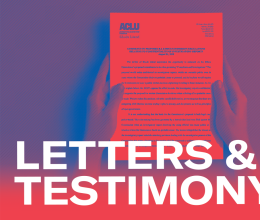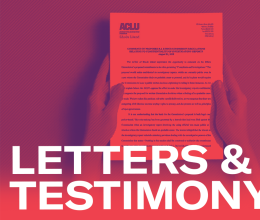The ACLU of RI, joined by three media organizations, today submitted a “friend of the court” brief in support of a federal lawsuit filed by the Providence Journal seeking a ruling on the constitutionality of Superior Court Associate Justice Netti Vogel’s controversial orders in April that initially blocked the release of the juror list, and barred members of the public from contacting the jurors, in a completed, high-profile murder case.
The brief, submitted by ACLU volunteer attorneys Thomas W. Lyons and Rhiannon Huffman, is on behalf of the ACLU; the New England First Amendment Coalition; the R.I. Press Association; and Sinclair Broadcast Group, which owns WJAR-TV. The brief is similar to one the groups filed a few months ago in Superior Court, where the Journal’s lawsuit was originally brought. Last month, the newspaper dismissed that suit and refiled the case in federal court.
In response to the lawsuit, the state has filed a motion to dismiss the case, arguing that it is moot because Judge Vogel has indicated she has no future plans to issue similar gag orders. However, the defendants’ brief nonetheless argues that Judge Vogel’s actions were constitutional, claiming that “protecting jurors' privacy interests … implicates the integrity and reputation of the judicial process.” It was this defense of the court order that prompted the four organizations to file a friend of the court brief in the case today to contest that position.
The amicus brief submitted in support of the Journal cites numerous court decisions for the proposition that the public and the media have a First Amendment right to both interview willing jurors after a verdict and to obtain the list of jurors. In terms of the public interest in this information, the brief cites a study of news articles involving juror interviews, which found that
“post-verdict interviews serve valuable purposes: they can help ensure jury accountability; they can help the public understand, and therefore accept, trial outcomes; they can educate the public about the realities of jury service; and they can improve the justice system’s functioning by exposing mistakes, misunderstandings, and misconduct.”
The brief concludes by arguing:
“The Superior Court’s orders facially violate the Providence Journal’s freedoms of the press and of speech [and] … the freedom of speech of other Rhode Islanders who may wish to speak with the jurors about the jurors’ exercise of their citizenship duties. This prevents all of us from confirming whether the jury acted as the conscience of the community in discharging those duties and whether the jurors were confident in their verdict. The Superior Court’s orders are also overbroad in that they place no reasonable limits as to the time, place, or manner of their prohibitions against free speech.”
Steven Brown, executive director of the ACLU of Rhode Island, said today: “While the defendants claim that the case is now moot, their continued justification of the Court’s actions in April banning the media from talking to jurors warrants a definitive determination from a court that this ban was a clear violation of the First Amendment. Too much is at stake in terms of the public’s right to know.”
Justin Silverman, executive director of the New England First Amendment Coalition, added: “To fully understand our judicial system, we must question jurors and learn from their experiences. This is a First Amendment right that needs to be upheld. The integrity of our courts is at stake.”






